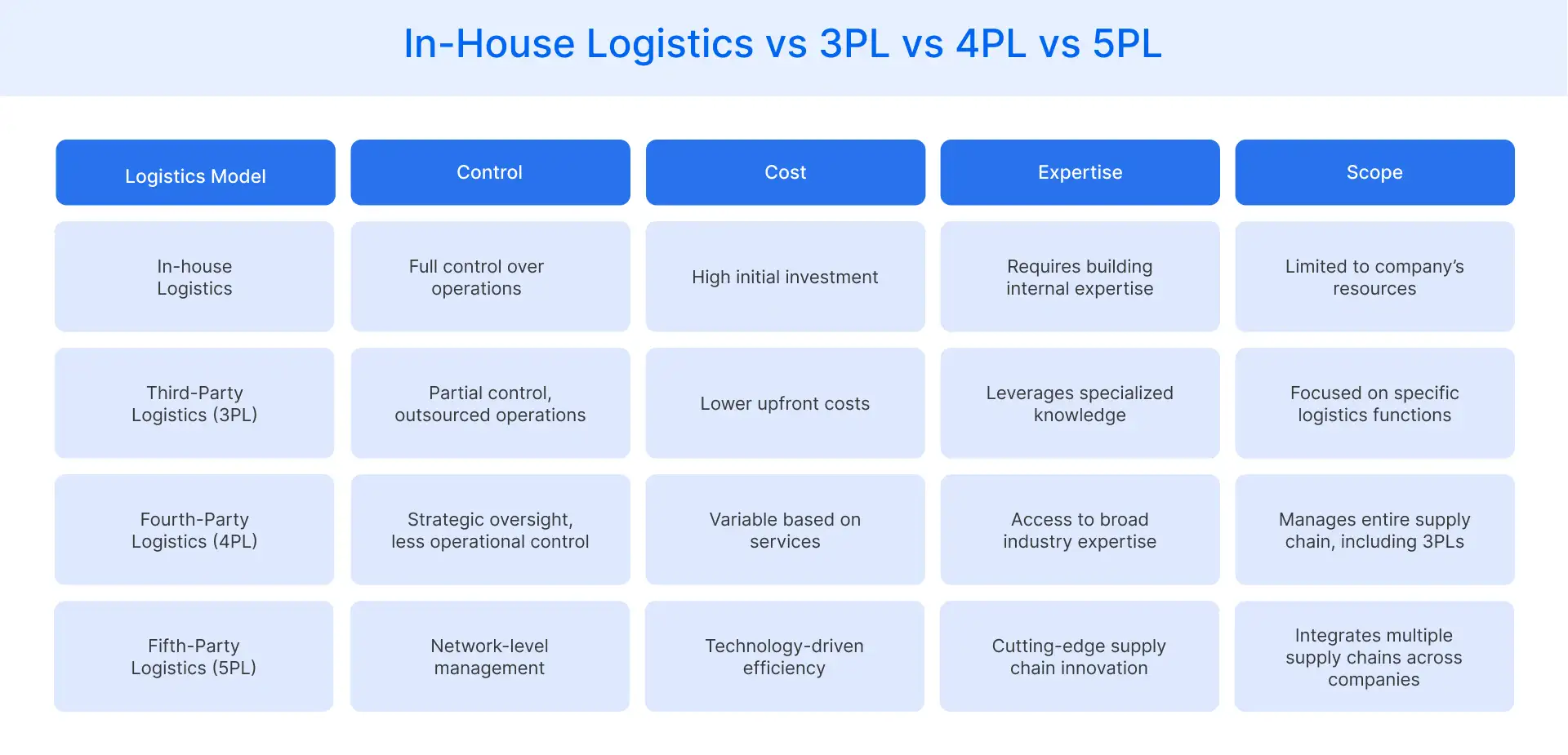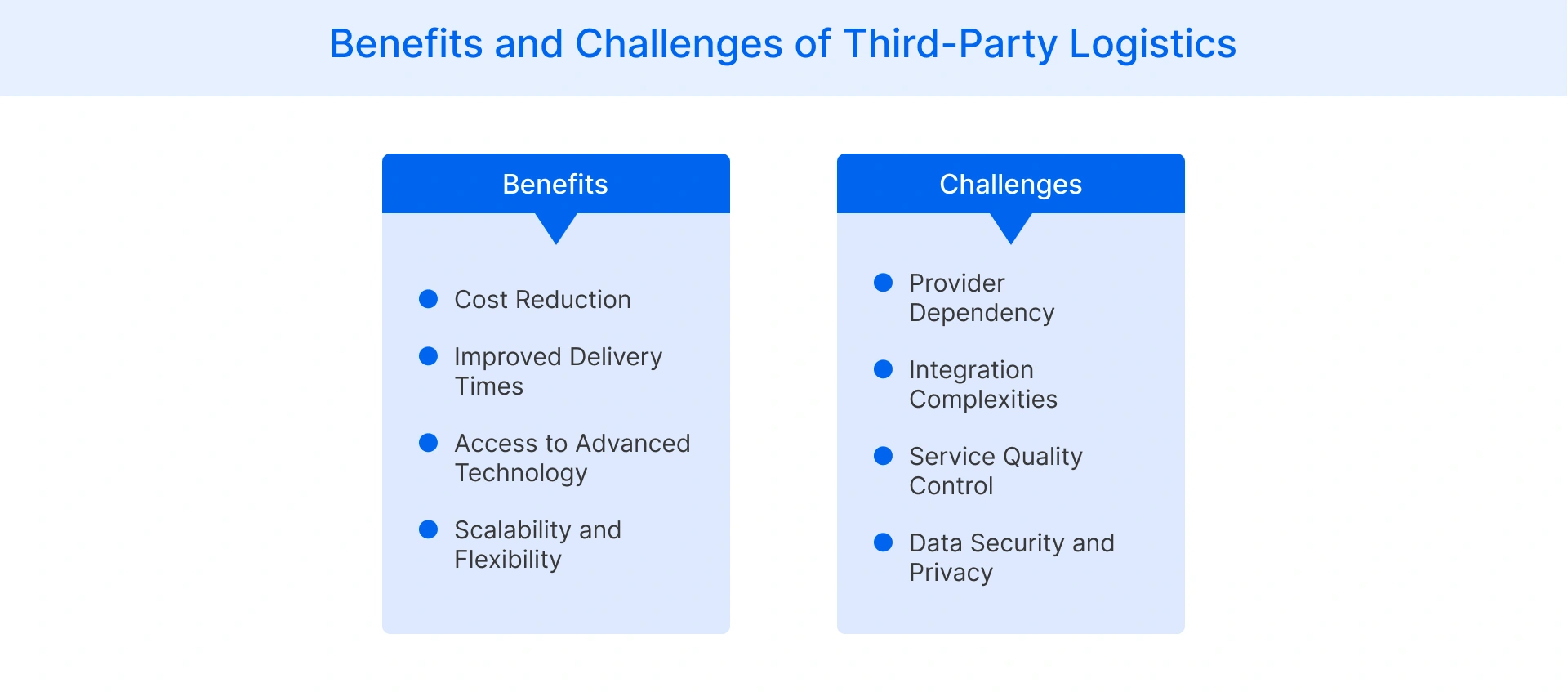Table of Contents
- What are Third-Party Logistics?
- How Third-Party Logistics Works?
- Types of Third-Party Logistics Services
- 3PL vs. Other Logistics Models
- Benefits of Using Third-Party Logistics
- Challenges in Third-Party Logistics
- Conclusion
What are Third-Party Logistics?
Third-party logistics (3PL) refers to the practice of contracting external service providers to manage logistics tasks, including shipping, storage, and order fulfillment. Businesses employ these services to handle the movement and storage of goods in retail and e-commerce settings.
3PLs eliminate the need for companies to invest in their own fleets, fulfillment centers, or logistics personnel. Retailers and ecommerce businesses adopt this business model to ensure products reach their customer base efficiently while focusing on product development and expansion.
Providers of Third-party logistics offer specialized expertise and resources, optimizing supply chains from procurement to final delivery. This outsourcing leverages established networks, supporting seamless operations across various locations in domestic and international markets, ultimately enhancing the bottom line.
How does Third-Party Logistics Work?
The typical workflow in a Third-party logistics operation includes:
- Partnership Initiation: Third-Party Logistics begins when a business owner engages a service provider to streamline supply chain tasks. Companies establish agreements with these specialists, often designating a single point of contact, outlining services like transportation services and warehousing to manage the entire process efficiently without in-house resources.
- Inventory Storage: Businesses send their goods to the 3PL provider’s warehouses for secure storage. The provider organizes and maintains the current inventory, ensuring it remains accessible and protected until customer orders trigger the next steps in the logistics process.
- Order Processing: The 3PL firm receives order details from businesses, often via integrated software. It then picks items from storage, packs them carefully, and prepares them for shipment, ensuring accuracy and speed to meet customer expectations seamlessly.
- Transportation Management: The provider coordinates transportation, leveraging its network of carriers to deliver products efficiently. Third-party logistics ensures goods move from their own warehouse locations to customers on time, handling logistics details like routing and tracking for reliable delivery.
- Delivery Completion: Finally, the 3PL provider ensures packages reach customers’ doorsteps as planned. It updates businesses with real-time tracking and inventory data, completing the workflow while allowing companies to focus on growth rather than logistics oversight.
Types of Third-Party Logistics Services
Third-party logistics providers offer various services tailored to meet diverse retail needs. Each type focuses on specific supply chain aspects, delivering specialized support to companies.
Transportation-Based 3PLs
Transportation-based third-party logistics providers concentrate on moving goods between locations effectively. They manage fleets and carrier relationships, ensuring products travel from suppliers to warehouses or directly to customers. This service offers a great way to reduce shipping delays and optimizes delivery routes for businesses.
Warehouse/Distribution-Based 3PLs
Warehouse and distribution-based third-party logistics firms specialize in storing and distributing inventory for companies. They maintain facilities to house goods, handle order fulfillment, and dispatch products to retailers or end buyers, ensuring that stock levels remain organized and accessible.
Forwarder-Based 3PLs
Forwarder-based third-party logistics providers focus on international shipping and customs processes for businesses. They arrange cross-border transportation, manage documentation, and navigate regulations, enabling retailers to expand globally without handling complex export/import logistics themselves.
Financial and Information-Based 3PLs
Financial and information-based third-party logistics services assist companies with cost management and technology solutions. They audit freight bills, process payments, and provide software for tracking shipments, giving retailers clear financial insights and operational control.
3PL vs. Other Logistics Models
When it comes to supply chain management, businesses have several logistics models to choose from. Each model offers distinct advantages, and the choice depends on a company’s specific needs, resources, and long-term strategy.
In-house logistics involves companies managing their entire supply chain internally. While this offers complete control, it often requires significant investment in infrastructure and expertise. 3PL, in contrast, allows businesses to outsource logistics functions, leveraging specialized knowledge and resources without heavy upfront costs.
Fourth-Party Logistics (4PL) takes outsourcing a step further. 4PL providers oversee the entire supply chain, including 3PL management. They offer a more comprehensive, strategic approach but may reduce direct control over day-to-day operations.
Fifth-Party Logistics (5PL) represents the most advanced model, integrating technology to manage multiple supply chains across various companies. 5PL providers focus on network optimization and technological innovation, often operating in specific industries or regions.

Benefits of Using Third-Party Logistics
Third-party logistics (3PL) providers offer numerous advantages to businesses seeking to optimize their supply chain operations.
- Cost Reduction: 3PL providers help businesses minimize operational expenses by leveraging economies of scale. They negotiate better rates with carriers, optimize warehouse storage space, and reduce the need for in-house logistics infrastructure, resulting in significant cost savings for clients.
- Improved Delivery Times: With their extensive networks and advanced routing technologies, 3PL companies can optimize shipping routes and modes of transportation. This efficiency leads to faster delivery times, enhancing customer satisfaction and enabling businesses to meet increasingly demanding delivery expectations.
- Access to Advanced Technology: 3PL providers invest in cutting-edge shipping logistics technologies, including warehouse management software, transportation management system, and real-time tracking tools. Clients benefit from these advanced solutions without the need for substantial technology investments or ongoing maintenance costs.
- Scalability and Flexibility: Third-party logistics companies allow businesses to scale their operations up or down based on demand fluctuations. This flexibility enables companies to adapt quickly to market changes, seasonal peaks, and growth opportunities without the constraints of fixed supply chain logistics infrastructure.
Challenges in Third-Party Logistics
While Third-Party Logistics offers numerous benefits, businesses may encounter certain challenges when outsourcing their logistics operations.
- Provider Dependency: Relying on a 3PL provider can create a sense of vulnerability for businesses. There's a risk of becoming overly dependent on the provider's services, potentially leading to challenges if the relationship deteriorates or if the 3PL faces operational issues.
- Integration Complexities: Integrating 3PL systems with existing business processes and technologies can be complex and time-consuming. Compatibility issues between different software platforms may arise, requiring careful planning and execution to ensure seamless data flow and operations.
- Service Quality Control: Maintaining consistent service quality can be challenging when logistics operations are outsourced. Businesses may face difficulties in monitoring and controlling the level of service provided to end customers, potentially impacting brand reputation and customer satisfaction.
- Data Security and Privacy: Sharing sensitive business and customer data with 3PL providers raises concerns about data security and privacy. Ensuring that 3PL partners have robust security measures in place and comply with relevant data protection regulations is crucial for maintaining trust and integrity.

Conclusion
Third-party logistics (3PL) has become an integral part of modern retail operations. It allows businesses to streamline their supply chain processes and focus on core competencies. The flexibility and scalability offered by 3PL solutions make them particularly valuable in today's dynamic retail landscape.
FAQ
Businesses should monitor several key performance indicators when working with a Third-Party Logistics provider. These include on-time delivery rate, order accuracy, inventory turnover, and warehouse operations. Other vital KPIs are average order processing time, return processing speed, and shipping cost per order. Customer satisfaction metrics, such as Net Promoter Score, are also crucial.
Small businesses benefit from Third Party Logistics by accessing affordable warehousing and shipping without heavy investments. Unlike large firms, they gain flexibility and scalability. This levels the playing field, helping smaller retailers compete effectively in the market.
Third-party logistics providers manage returns by receiving returned goods, inspecting them, and processing refunds or replacements for businesses. They streamline reverse logistics, handling transportation and restocking efficiently. This reduces the burden on retailers, ensuring smooth customer service and inventory updates.

